|
There
is nothing that lifts
my spirits more or
provides the much
needed balm after a
busy summer of work
than my annual fall
journey to London to
take in what the West
End has to offer.
This year, instead of
flying, we made a
transatlantic crossing
with the Queen Mary 2
– a heady
experience that
conjured up the
luxuries of past
travel. And once in
London, we headed
almost immediately for
the theatres.
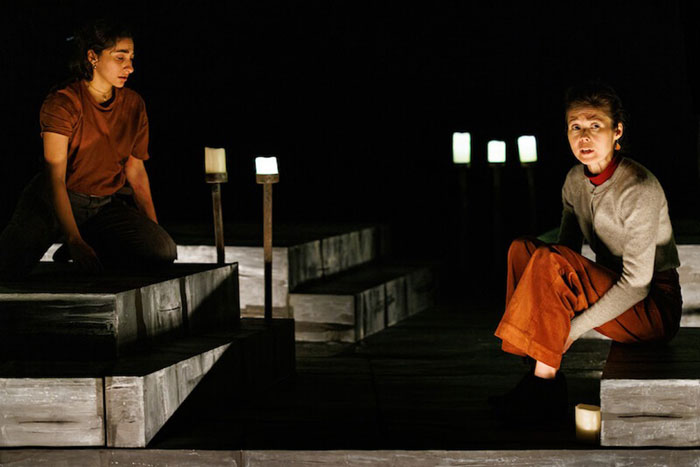
Our first evening was Ghost Stories, a minimalist production in
the tiny Sam Wanamaker Theatre within the confines of the
Globe complex. The tiny pentagonal shaped space with a thrust
stage and wooden benches seemed a mini-Globe, albeit enclosed,
and the stage decor consists of a latticework of lit candles that
gradually are extinguished as the evening progressed. The script
comprises four interrelated tales by Tassa Deparis, James
McDermott, Eloise Pennycott and Aisha Zia, directed by Emmy
Ling Williams, is performed by Becky Barry and Sharan Phull.
The actresses give remarkable sensory performance, creating with
voice and movement the haunting effects of the tales. If there is a
criticism, it is that the play relies too much on narration – on
telling- and very little on action. Still its power of lyrical language
to stimulate the imagination is, in itself, impressive.
Our second outing, a new musical playing at the Ambassador
Theatre, The Curious Case of Benjamin Button, proved to be the
highlight of the week for me. With book and lyrics by Jethro
Compton and music and lyrics by Darren Clark, this small cast
folk opera captures the spirit of F. Scott Fitzgerald's original story,
as well as the Cornish folkscape and Celtic idiom in which it is set.
Largely sung through with short interludes of lyrical dialogue, the
musical recounts the bittersweet tale of Benjamin Button, born
old whose life takes him backwards into infancy. Compton (with
expert help from choreographer, Chi-San Howard) is also
responsible for the unit set that morphs into so many locales and
the fluid staging that incorporates the musicians into the action.
John Dagleish does a stellar job of playing the title character
through all the phases of his life with a quiet dignity, while
Philippa Hogg is touching as his wife, with the rest of the cast
vividly playing multiple roles. Poignant, inspirational, deeply
human, Benjamin Button is a tale told with humor and
compassion in a musical setting that is irresistibly uplifting.
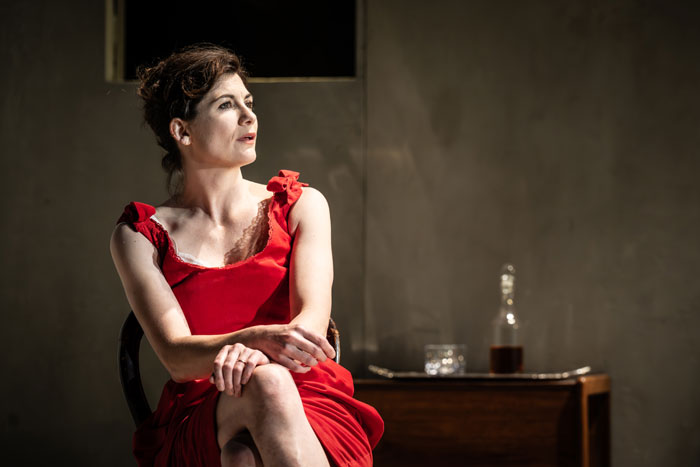
In contrast that evening, we visited the Trafalgar Theatre for an
adaptation of John Webster's 17th century revenge play, The
Duchess of Malfi. Grateful to be able to see this rarely performed
work, I was also puzzled and put off by the inconsistencies of the
production's modernization and the superimposed 21st century
reading of a feminist struggle. Director Zinnie Harris chooses to
modernize much of the dialogue, thereby obviating the unrhymed
verse of Webster's original. Somewhat jarringly, however, some
noted speeches remain exactly as they are in the original. Harris
adds songs – which is consistent with Elizabethan/Jacobean
drama - though they, too, seem incongruous. Perhaps most
discordant is the clear overlay of a modern perspective on the
Duchess's fate as a woman manipulated, abused, and ultimately
destroyed by the men around her. As compelling and shattering
as this viewpoint makes the second act with its scenes of torture
and murder, it completely misses the perspective of Webster's
play. The revenge play is a genre meant to deliver bloody
sensationalism - gore, horror, ghosts – in short, as many dead
bodies as possible as the curtain falls. Jacobean audiences would
likely not have seen the Duchess as a heroine battling male
dominance, but a frail woman of flesh and blood who meets the
justice of the time at the hands of the Church and her brothers.
The performance that Jodie Whittaker delivers defies this
interpretation, and is, in and of itself, forceful and compelling,
with strong support from Joel Fry as Antonio and Jude Owusu as
Bosola. The décor and costumes by Tom Piper complete the
modernization of the work, setting it in a black/white/gray
universe of desolation, while the sound design of Michael John
McCarthy adds to the horrors of Act Two. Despite all these
caveats, it was well worth the chance to see a revival of this work,
even with its divergence from the original.
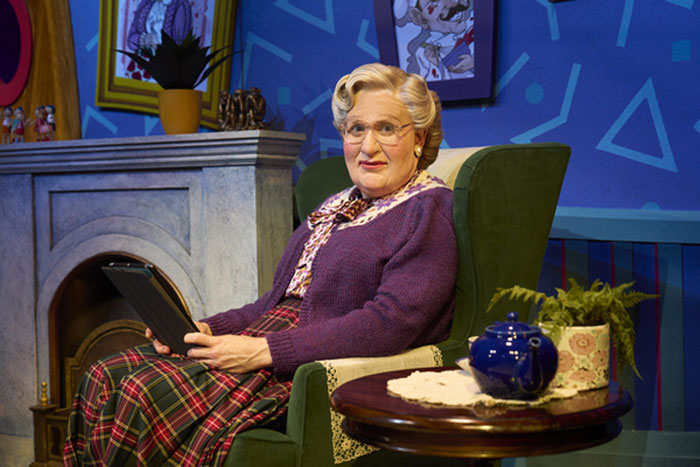
From dark Jacobean tragedy, our odyssey took us to two more
musicals, Mrs. Doubtfire and The Devil Wears Prada. Mrs.
Doubtfire with a book, music, and lyrics by Wayne and Karey
Kirkpatrick (and John O'Farrell, additional lyrics) follows closely
the beloved Robin Williams' movie in plot and ultimate message
about family, individuality, and acceptance. The Kirkpatricks
find the quirky humor in their characters and situations; their
lyrics are clever and witty, and their music melodic enough to be
appealing. The comedy of the show depends on the virtuosity of
the actor playing Daniel Hillard/Mrs. Doubtfire, who must
portray two different roles in two genders and be gifted with an
array of voices and impersonation skills. On the evening we
attended, understudy Billy Roberts stepped into the role and
made it his own. Vocally strong, a lively impersonator with a
strong sense of comic timing, he also managed to guide the cast
home to the finale of family reunion, warmth, and love. Catherine
Zuber's costumes contribute greatly to the overall effect, while
David Korins' décor and Philip S. Rosenberg's lighting skillfully
provided the many changing locales. Jerry Zaks (with
choreography by Lorin Latarro) directs with a sure-hand, a comic
flair, and an unerring instinct for the showstopping moments.
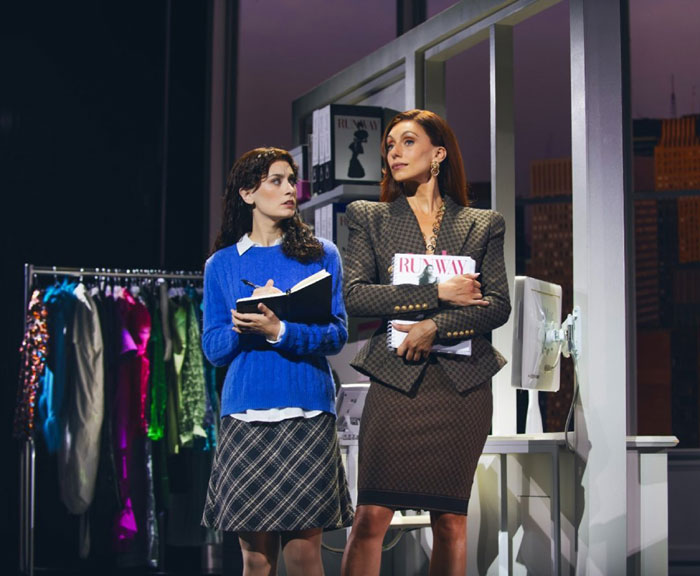
Similarly derived from a movie, the new musical The Devil Wears
Prada was still in previews when we saw it. Clearly, this opulent,
glitzy production at the Dominion Theatre is aiming to fill the slot
that Moulin Rouge held. With music by Elton John, lyrics by
Shaina Taub and Mark Sonnenblick, book by Gareth Owen,
directed and choreographed by Jerry Mitchell, and Vanessa
Williams as Miranda Priestly, this musical exudes glamour and
star power. But in the early performance we saw, there is also a
great deal of tweaking needed. The book follows the movie 's plot
quite closely, and the subject matter allows for dazzling sets and
costumes - which Tim Hatley and Gregg Barnes deliver. Bruno
Poet's lighting design delivers all the effects of the runway, but
Gareth Owen's sound design, at the performance we saw, was
gravely in need of reworking - the lyrics muddied, the vocalists
overwhelmed by the orchestra. Williams looks stunning as the
imperious Priestly, and she manages her essentially patter songs
respectably, but she does not tower over the performance as she
should. Instead, the finest performances come from newcomer
Georgie Buckland as Andy and Amy Di Bartolomeo as Emily –
both with belt-it-to-the-rafters vocal power, strong dance skills,
and incisive characterizations. Matt Henry as Nigel gets one of the
show's most sympathetic ballads, but one has the sense he has yet
to grow fully into the role. It is likely fair to expect this production
will make its way to Broadway next, and it will be fascinating to
see how it has grown in the interim.
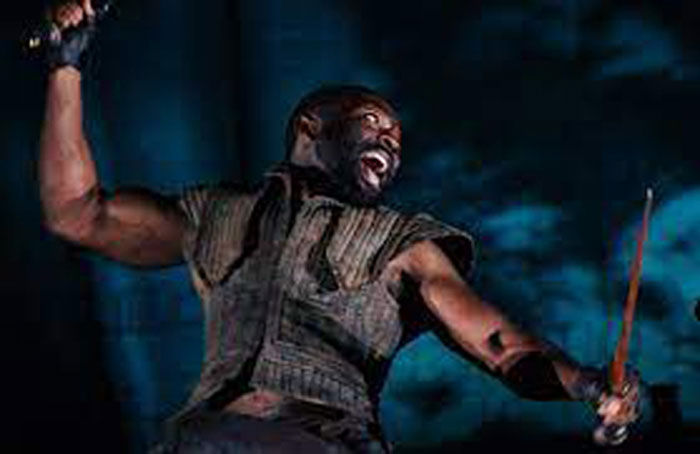
After two lighthearted evenings, we took in Shakespeare's Coriolanus at the Olivier Theatre in the National Theatre
complex. Brilliantly staged and performed, this late
Shakespearean drama lacks the visceral quality of some of his
best history-tragedies. The central character is Coriolanus, a
Roman general whose heroism is diluted by his tragic flaw: rigid
lack of empathy for the people. A warrior with no diplomatic
skills, Coriolanus makes a dismal choice for Consul, and forced to
leave Rome and ally himself with former enemies, his quest for
revenge on his birthplace results in his own death when he yields
to his mother and wife's pleas to spare the city. Directed by
Lyndsey Turner with stunning black/white projections and
elegant sculptural decor by Es Devlin (video, Ash J. Woodward),
stark lighting by Tim Lutkin and chilling sound design by Tom
Gibbons, the visual production is the Olivier Theatre at its best.
So, too, the cast, led by David Oyelowo in a towering performance
as Coriolanus, with strong support throughout the roster. Even if Coriolanus is not one of Shakespeare best plays, a thoughtful,
striking production such as this one can still grip the viewer.
The final evening was spent at the Lyric Theatre with the West
End production of Anaïs Mitchell's Hadestown. This gem of a
show proves to be inspirational and uplifting wherever it goes, so
perhaps it is churlish of me to suggest that the Broadway cast far
outshone this West End one that seemed a little out of its element
with the Motown/New Orleans idiom of the music, the dialect,
and some of the vocal demands. That said, the cast and musicians
deliver a committed performance that ultimately compels from
the force of the material: a truly timeless myth, a lively lyrical
setting, and an exquisitely poetic libretto. The British audience
was mesmerized and, and their enthusiasm was catchy.
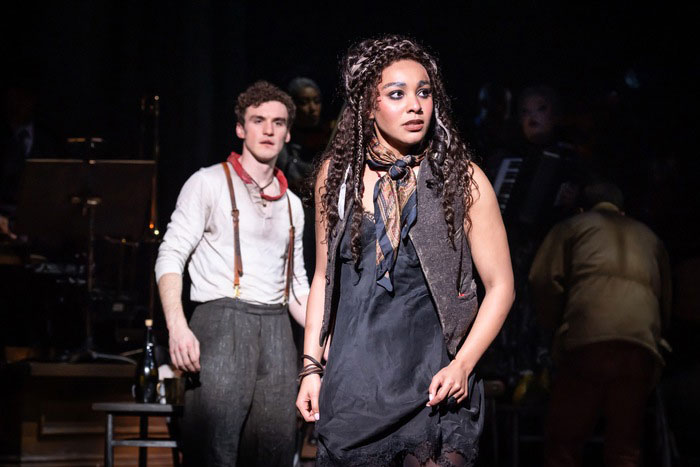
After all, on the day after a disastrous American election, how
could one resist the message of this beautiful work. A poet, an
artist descends into hell to save the love of his life. Even when he
fails, his song is not stilled. In the finale of Hadestown,
Persephone reaffirms life, light in the darkness, and the courage
to sing on when she says: "…the one who sings in the dead of
night, I raise my glass to him."
There is going to be plenty of darkness ahead, so we will all have
to listen keenly for the song that holds the light.
|
|